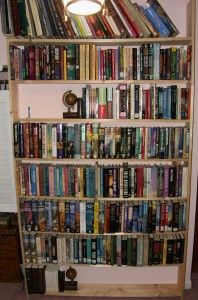Wednesday

Kinds of Reading
I'm increasingly struck by the different types of reading. With the advent of the ubiquitous Web, lots of people are thinking about it, but Web reading v. book reading seems pretty obvious to me. The former is naturally inclined to browsing, the other inclined to thoroughness.
I'm talking about differences in book reading. And not Harlequin romances versus Elliott's poetry either, though those genres perhaps represent the two poles of book reading. The romance book can be devoured, quickly and voraciously, put away like bon bons by a drunk after a heavy night of drinking (like the young nymphs in those books, I suppose). The poetry, on the other hand, requires the reader to stop and ponder, to wonder.
I don't like either kind, incidentally. I don't see the point of romance novels (if I'm going to absorb trash, I just prefer to take it directly via TV, like smoking the cocaine (crack-style) instead of snorting it). And with poetry, the effort is simply too halting and slow. I lack the artistic patience.
Between the Harlequin Pole and Poetry Pole, though, are lots of different books. This struck me recently as I put down Jeff Riggenbach's Why American History is Not What They Say and picked up Bertrand de Jouvenel's The Ethics of Redistribution. I had flown through Riggenbach's book, thoroughly enjoying it, but I found myself eagerly looking forward to de Jouvenel, knowing it would require a much slower pace.
Both are non-fiction books, yet I'd say Riggenbach's leans more toward the Harlequin Pole and de Jouvenel's leans more toward the Poetry Pole. It's not surprising, of course. A book on history is more fact-filled and such prose can be devoured more quickly than a book of philosophy. Still, it set me thinking about the poles of reading and I've come up with the following tentative spectrum:
HARLEQUIN
CONTEMPORARY FICTION
CLASSIC LITERATURE
CURRENT EVENTS
BIOGRAPHY
HISTORY
POLITICAL SCIENCE
PHILOSOPHY
THEOLOGY
MEDITATION
SCRIPTURE
POETRY
I'm not saying either pole is better or worse. I obviously lean toward the poetry pole and, though I rarely read it, believe it is a high literary pursuit, whereas I scoff at romance novels. I, in other words, view romance novels as trash beneath my notice and poetry sublime above my reach, but my goal here isn't to say which pole is better, but rather to point out that the different poles require different types of attention and pace due to the very nature of their subject.
It's not simply about speed. Grammatical errors and stylistic problems can turn a hack writer's short story into a reader's long nightmare. No, there's simply something about the different poles that require more or less contemplation. Poetry often requires you to contemplate every word, sometimes the punctuation. Scripture, read sublimely, requires nearly the same approach, without regard to punctuation. And on down the line, until you get to the romance novel, which requires as much contemplation as a boy brings to the backseat of a car during a date.
In my own reading, I like a mix. I like to gulp down history, but then I like to “switch it up” with some philosophy and its contemplative cousins on the Poetry Pole side of the spectrum.
I suspect it says a lot about existence in general. Life can be lived like one reads a romance novel: non-stop activity, getting one's “education” on the freeway through talk-radio and through super information highway headlines, flitting through life like the pinball machine's silver ball. Or one can live life in the poetry sphere: spending one's days immersed in books and thought.
Neither extreme strikes me as healthy.
Into every life, some contemplation should fall, as well as a dose of romance and fun. How one measures out the poles in his or her own life is one of the many balances of existence each of us much choose for themselves.
